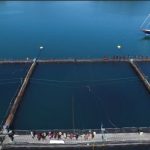Tag Archives: Louisiana Shrimp Association
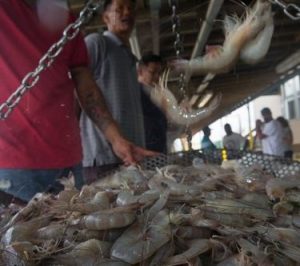
Louisiana shrimpers avert strike but their catch hits all-time low
Louisiana shrimpers are getting a little more money for their catch – but a lot less of a catch. The summer has been a roller coaster for the state’s shrimp industry. Last month, shrimpers threatened to strike if prices continued their steep decline, reaching levels early this year that hadn’t been seen since the 1980s. But a slight uptick – about a nickel more per pound of shrimp – placated many shrimpers. “It pacified them from doing anything,” Acy Cooper, a Venice shrimper and president of the Louisiana Shrimp Association, said Thursday (Sept. 6). “They’re kind of good with it, but not good with it, if you know what I mean.” >click to read<12:49

Louisiana shrimpers consider strike as prices plummet
Louisiana shrimpers vowed this week to go on strike if shrimp prices take yet another tumble. About 200 shrimpers gathered in Houma on Wednesday (Aug. 8) to vent their frustrations about foreign imports that have driven shrimp prices to levels not seen since the 1980s. They also fumed over a lack of political support for tariffs and other measures that could shore up an industry they say is heading toward extinction. “We can’t make it on cents. We need dollars,” said Dean Blanchard, a Grand Isle shrimp distributor. “There’s no way this can continue.” >click to read<21:59
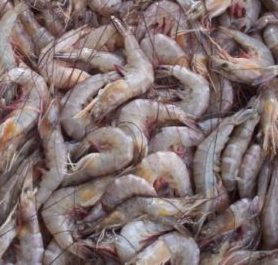
Louisiana Shrimpers seek more federal protection
Speaking during the Louisiana Shrimp Association meeting at the American Legion Hall in Houma, shrimpers said import tariffs aren’t enough to protect their business. And foreign companies should not be able to sell shrimp in the U.S. if they are using banned antibiotics. “We’re being treated differently than other businesses that are in the same situation we’re in,” said Dean Blanchard, owner of Dean Blanchard Seafood Inc. in Grand Isle. “We’re comparable to rice farmers and sugar-cane farmers.” When these farmers, many of them in Louisiana, couldn’t compete with imports, they received help, Blanchard said. The federal government provides them subsidies. He added that they would be out of business if they had to work as hard as shrimpers. >click to read<12:30

Louisiana Fisherman Talks Water Quality and Nutrient Reduction with Iowa Farmers
Nutrient runoff from Iowa agriculture is one of the leading causes of the growing “dead zone” in the Gulf of Mexico, an oxygen-deprived section of the Gulf, which last year was recorded to be the size of the state of New Jersey. “About 29 percent of the load coming into the Gulf originates in Iowa,” says Larry Weber, an executive associate dean professor in the University of Iowa’s College of Engineering. “If we take the Iowa portion out of the Gulf, then the nitrate load to the Gulf of Mexico would be going down. The real challenge in fixing the Gulf hypoxia starts in Iowa.” In this special edition of River to River, host Clay Masters talks with panelists about what Iowa farmers are doing, or not doing, when it comes to reducing nutrient runoff into the Mississippi River. He also speaks with Thomas Olander, Chairman of the Louisiana Shrimp Association and a fourth generation shrimper. Audio report >click to listen<10:23

Hundreds of upset shrimpers pack Houma meeting
“We are on the bottom. It’s time to stand up and say we are not going to be on the bottom anymore,” says a shrimper. Passionate shrimpers packed a Louisiana Shrimp Association meeting. All of them were asking for help. “The prices of these shrimp are unbelievably low. It’s the worse I’ve ever seen or heard of,” says Troy Parria. The shrimpers say the industry is struggling to stay afloat with prices as low as 40 cents a pound. “We just need a price our shrimp to make a fair honest living that’s all we ask for,” says Parria. They say import prices are forcing the prices of locally caught shrimp to be extremely low. Video, >click to read<15:06
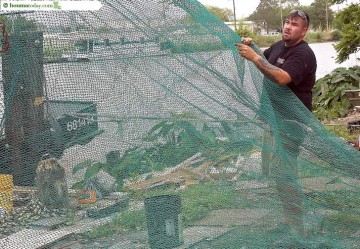
Help sought from a higher authority to help shrimping crisis
Local shrimp fishermen and dealers say the industry’s prices are locally hitting some of the lowest points in nearly a decade, and warning of a market collapse if some kind of help is not forthcoming. What kind of help will do the most good has not been settled, but the industry’ voices will speak 4 p.m. Friday at the Lennox Hotard American Post at 602 Legion Drive in Houma. Among confirmed attendees is U.S. Sen. John Kennedy R-La. “I hope he can sit with us before the meeting so that we can explain what is going on with us,” said Louisiana Shrimp Association President Acey Cooper. Angela Portier of Chauvin,,, “We want to know if there Is anything he can do to help, is there anything he can do to help raise our shrimp prices,” she said. “We need a direct line to President Trump >click to read<09:39
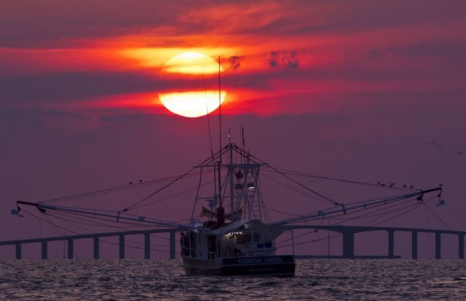
US Shrimp business making slow progress
Despite low dockside prices and other setbacks, local shrimping families say they have hope for this year and those to come, pointing to signs of recovery that are small, but nonetheless seen as positives. The industry got a big shot in the arm earlier this month when President Donald Trump signed into law an appropriations bill that includes money to monitor shrimp coming from other countries into the US, to verify that the companies involved are acting in accordance with US trade laws. >click to read<16:19
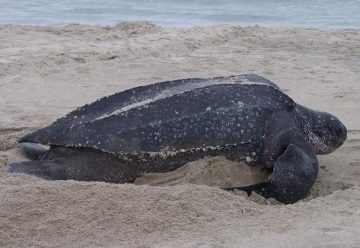
Petition to Reclassify: Fight begins over fate of leatherback sea turtle
Protected as endangered species for nearly half a century, their Atlantic population soon may lose that status, in what is becoming a fight between commercial fishermen and conservationists. The Blue Water Fishermen’s Association, which represents longline fishermen who catch swordfish, tuna and other big fish along the east coast, has petitioned the federal government to reclassify from endangered to threatened the northwest Atlantic population of leatherbacks,,, With the Pacific leatherback population crashing, they say the northwest Atlantic population should be classified separately so U.S. fishermen aren’t penalized for the failure of other countries to protect them. >click to read<09:36
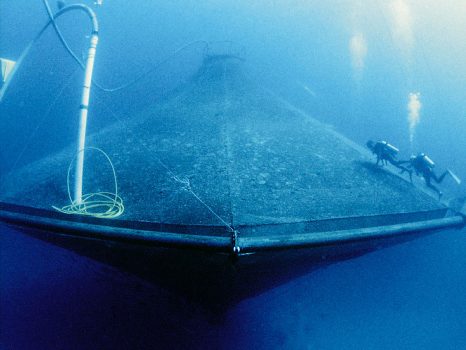
Offshore Aquaculture: Groups divided over Gulf fish farming
While proponents of aquaculture support expanding fish and shellfish farming in the Gulf of Mexico, local fishermen and food safety groups are wary of the consequences. “Developing offshore aquaculture in the Gulf of Mexico will benefit everyone. Consumers will get additional access to sustainable domestically grown seafood,” said Jim Gossen, president of the Gulf Seafood Foundation. “Using the latest proven management practices, this should provide more wild fish to both the recreational and commercial fisheries.” In 2016, NOAA filed a final rule implementing the nation’s first comprehensive regulatory program for aquaculture in federal waters. The rule allowed for the establishment of a regional permitting process to manage the development of an environmentally sound and economically sustainable aquaculture industry in the Gulf. However, local and national groups oppose the current plan in its entirety or how it’s being implemented. click here to read the story 08:56
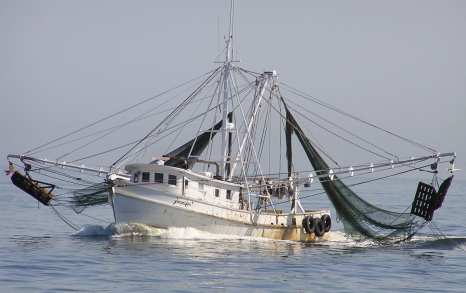
Louisiana Shrimp Fishermen Face New Challenges – White Spot Disease
The experience is not universal within the nation’s eight shrimp-producing states, nor even within Louisiana. That’s why some shrimpers suspect that undiagnosed trouble may lurk within the local fishery itself. At the tail end of this year’s crawfish season, white spot disease was detected in Louisiana ponds. It’s not too far a jump, some in the industry, to suspect contamination with the virus as a cause for decline. “Is it the same strain that is in the Asian shrimp that gets imported here?” said Acy Cooper, president of the Louisiana Shrimp Association.,,, Jeffrey Marx, the chief shrimp biologist at the Louisiana Department of Wildlife and Fisheries, is skeptical.,,, Fishermen want more research to be done, and some precautions to be taken, however. click here to read the story for links about White Spot here and Australia click here 08:34
Fishermen oppose river diversions to fix Louisiana coast
 Fishermen spoke out Tuesday against plans to rebuild coastal Louisiana by siphoning Mississippi River freshwater and sediment into the Bayou State’s disappearing sub-deltas. “I do not believe we have seen evidence that you’re going to build all this land, protect all these people, with these diversions,” said Clint Guidry, president of the Louisiana Shrimp Association, representing commercial shrimpers. Byron Encalade, president of the Louisiana Oystermen’s Association, said he “lived” the effects of a freshwater diversion in operation since 1991,,, Read the rest here 19:05
Fishermen spoke out Tuesday against plans to rebuild coastal Louisiana by siphoning Mississippi River freshwater and sediment into the Bayou State’s disappearing sub-deltas. “I do not believe we have seen evidence that you’re going to build all this land, protect all these people, with these diversions,” said Clint Guidry, president of the Louisiana Shrimp Association, representing commercial shrimpers. Byron Encalade, president of the Louisiana Oystermen’s Association, said he “lived” the effects of a freshwater diversion in operation since 1991,,, Read the rest here 19:05
Will river water save Louisiana’s coast or kill the marsh?
 St. Mary Parish, La. — Azure Bevington, a PhD student in coastal wetlands ecology at LSU, stands in the Wax Lake Delta, a spot that did not exist when she was born in 1980. “It’s really amazing to think about, that this is really some of the newest land in the United States, or the world,” Bevington said. more@wvue
St. Mary Parish, La. — Azure Bevington, a PhD student in coastal wetlands ecology at LSU, stands in the Wax Lake Delta, a spot that did not exist when she was born in 1980. “It’s really amazing to think about, that this is really some of the newest land in the United States, or the world,” Bevington said. more@wvue
Mississippi River freshwater and sediment diversions criticized by George Barisich, president of the United Commercial Fishermen
“If sediment diversions come through as designed, I won’t be here,” Barisich said about the fishing industry. He asked the advisory commission to take another look at sediment diversions and how they compare with the effectiveness of dredging and placing sediment to build land instead. Clint Guidry, president of the Louisiana Shrimp Association, echoed Barisich’s statements and said, “I think there’s not enough concern for fisheries.” continued at The Advocate
Louisiana Fishermen fight major river diversions – “We are being sacrificed in hopes that we can build land with these diversions,”
HoumaToday.com – Fishermen are protesting large Mississippi River diversion projects they fear could damage productive fisheries in the Barataria Basin and east of the river. But the diversions are necessary for saving the coast, state officials and environmentalists say. Clint Guidry, president of the Louisiana Shrimp Association, said a number of industry groups have joined forces to form The Save Louisiana Coalition, continued
Louisiana Shrimpers optimistic over new season
 Shrimp season opened Monday morning, and fishermen headed into state waters with a certain amount of optimism following years of dismal catches. “Fishermen are always optimistic,” said Clint Guidry, president of the Louisiana Shrimp Association. “Between hurricanes, flooding, losing our boats and our homes, we have to be. It would be really easy just to quit and leave. But this is what we do. This is our culture.” continued
Shrimp season opened Monday morning, and fishermen headed into state waters with a certain amount of optimism following years of dismal catches. “Fishermen are always optimistic,” said Clint Guidry, president of the Louisiana Shrimp Association. “Between hurricanes, flooding, losing our boats and our homes, we have to be. It would be really easy just to quit and leave. But this is what we do. This is our culture.” continued











































